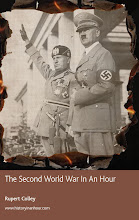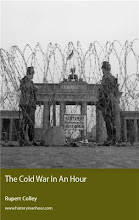 George C. Marshall, the originator of the post-Second World War Marshall Plan, was born today, 31st December, in 1880. US President, Harry S. Truman, once referred to Marshall as "the greatest living American", and in January 1947 appointed him as his Secretary of State where Marshall formulated his plan, the European Recovery Programme (ERP).
George C. Marshall, the originator of the post-Second World War Marshall Plan, was born today, 31st December, in 1880. US President, Harry S. Truman, once referred to Marshall as "the greatest living American", and in January 1947 appointed him as his Secretary of State where Marshall formulated his plan, the European Recovery Programme (ERP).The Cold War
More commonly known as the Marshall Plan, the ERP aimed to revive Europe's post-war economies, to alleviate the hardship, and to deprive communism its foothold in Europe just as the Cold War began taking shape. Once these economies were stabilised, America too would benefit as trade between Europe and America increased.
The offer was extended to the countries of Eastern Europe and the Soviet Union itself. The Soviet Union had received huge loans from America during the war to help defeat Germany and now, during the immediate post-war years, further aid would have been hugely beneficial to a country still suffering economically from the consequences of its war effort.
Stalin says no
But Stalin was never going to allow American / capitalist interference with the Soviet economy, and nor would he permit his satellites. However, Czechoslovakia and Poland saw the obvious benefits of American aid, and both accepted invitations to attend a conference, set for July 1947, to discuss the Marshall Plan.
Furious, Stalin forbade them to go. Meekly, representatives of the Czechoslovakian and Polish governments traipsed to Moscow to face their dressing-down from Stalin, and returned home to politely decline the invitation to Paris.
"If Italy goes red"
In April 1948, Italy went to the polls. American Congress was worried: "If Italy goes red, Communism cannot be stopped in Europe," and threatened to prohibit Italy from receiving Marshall Aid if the Communists won. They did not.
The Marshall Plan, therefore, had the effect of reaffirming Churchill's concept of the Iron Curtain by forcing countries to decide whether their loyalties lay to the west or east. Loyalties that would endure throughout the Cold War. Sixteen countries finally accepted aid, which by 1951, had amounted to $13 billion.
Marshall was awarded the Nobel Prize for Peace for his contribution to the recovery of Europe after the Second World War. He died in on October 16th, 1959.
Rupert Colley.
Read about the whole of the Cold War in just sixty minutes.






No comments:
Post a Comment